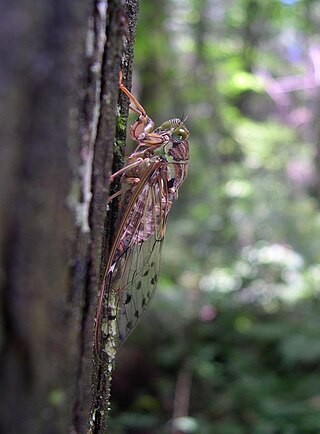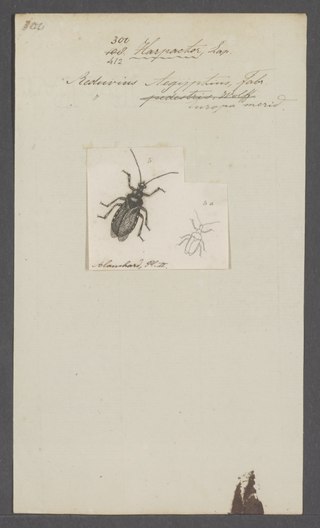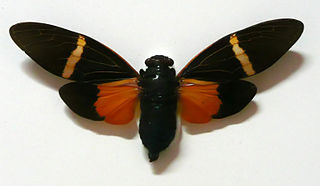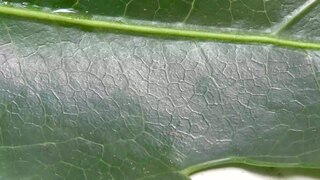Semia is a genus of Asian cicadas in the tribe Cicadini, erected by Matsumura in 1917.

Tanna is a genus of cicadas from Southeast Asia and East Asia. In 2010 Lee and Hill placed Tanna in the subtribe Leptopsaltriina, which is now in the tribe Leptopsaltriini together with a number of related genera that also possess abdominal tubercles, including Leptopsaltria, Maua, Nabalua, Purana, and others.

Harpactor is a genus of assassin bug family (Reduviidae), in the subfamily Harpactorinae.

Tosena is a genus of cicadas from South-East Asia. They are the type genus of tribe Tosenini. Species formerly included in Tosena are Distantalna splendida, Formotosena montivaga, Formotosena seebohmi and Trengganua sibylla.

Pyrgomorphidae is a family of grasshoppers in the order Orthoptera; it is the only family in the superfamily Pyrgomorphoidea. Pyrgomorphidae is found worldwide in tropical and warm temperate regions, but the vast majority of the family's approximately 500 species are from Africa, Asia and Australia. Their name is probably derived from pyrgos meaning "tower": a reference to the form (morph) of the head in the type genus Pyrgomorpha and other genera.

Bryocorinae is a subfamily of bugs in the family Miridae.

Dicyphini is a tribe of bugs in the family Miridae.

Tachyporus is a genus of rove beetle in the tribe Tachyporini. It is the type genus of both the tribe Tachyporini and the subfamily Tachyporinae.
Chamus is a genus of Miridae or capsid bugs in the tribe Dicyphini and subtribe Odoniellina. Species can be found in central and southern Africa, with the type C. wealei first described by Distant in 1904.

Hyalessa is a genus of cicadas in the subfamily Cicadinae, found in the Palearctic and East Asia. It is the sole genus in the tribe Sonatini.
Amulius is a genus of Asian bugs in the family Reduviidae. It has been placed in the tribe Ectinoderini: the 'Oriental resin bugs'.

Ectinoderus is a genus of Asian bugs in the family Reduviidae. It is the type genus of the tribe Ectinoderini: the 'Oriental resin bugs'.

Nephotettix is a genus of planthoppers in the subfamily Deltocephalinae and tribe Chiasmini. Species are mostly found in Asia, although two are from Africa.

Monalonion is a genus of bugs in the family Miridae and tribe Dicyphini.
Cercotmetus is a genus of water bugs in the subfamily Ranatrinae. The recorded distribution of this genus is from is from mainland Asia to New Guinea and northern Australia.
Sahlbergella is a genus of African bugs in the family Miridae and tribe Dicyphini.
Odoniella is a genus of African bugs in the family Miridae and tribe Dicyphini.

Cicadatra is a genus of European and Asian cicadas; it was erected by Kolenati in 1857 and is typical of the tribe Cicadatrini.
Qadria is a genus of true bugs belonging to the family Cicadellidae (leafhoppers). Belonging to the Erythroneurini tribe, Qadria consists of fourteen species.









